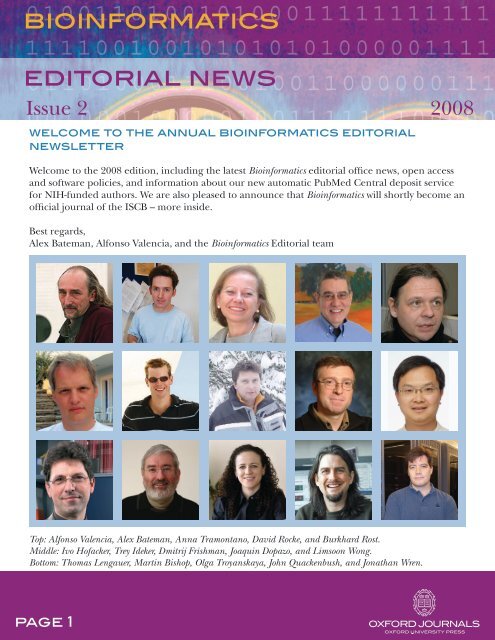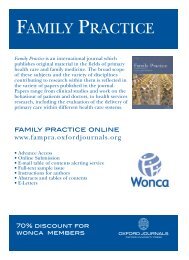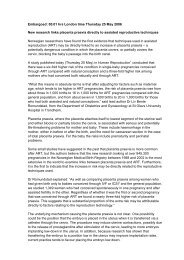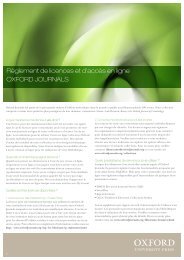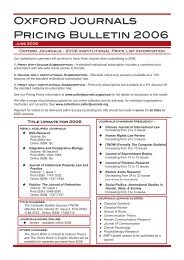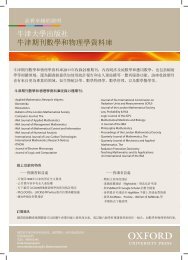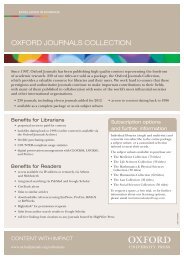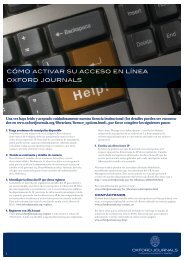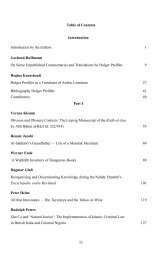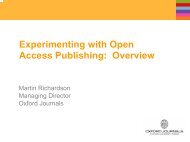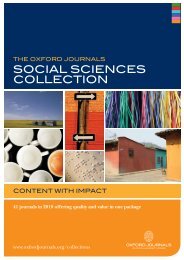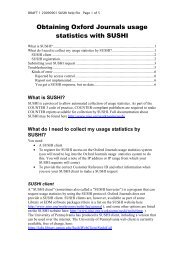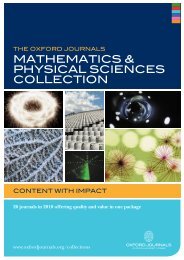bioinformatics editorial news - Oxford Journals
bioinformatics editorial news - Oxford Journals
bioinformatics editorial news - Oxford Journals
You also want an ePaper? Increase the reach of your titles
YUMPU automatically turns print PDFs into web optimized ePapers that Google loves.
ioinformatics<br />
<strong>editorial</strong> <strong>news</strong><br />
Issue 2 2008<br />
welcome to the annual <strong>bioinformatics</strong> <strong>editorial</strong><br />
<strong>news</strong>letter<br />
Welcome to the 2008 edition, including the latest Bioinformatics <strong>editorial</strong> office <strong>news</strong>, open access<br />
and software policies, and information about our new automatic PubMed Central deposit service<br />
for NIH-funded authors. We are also pleased to announce that Bioinformatics will shortly become an<br />
official journal of the ISCB – more inside.<br />
Best regards,<br />
Alex Bateman, Alfonso Valencia, and the Bioinformatics Editorial team<br />
Top: Alfonso Valencia, Alex Bateman, Anna Tramontano, David Rocke, and Burkhard Rost.<br />
Middle: Ivo Hofacker, Trey Ideker, Dmitrij Frishman, Joaquin Dopazo, and Limsoon Wong.<br />
Bottom: Thomas Lengauer, Martin Bishop, Olga Troyanskaya, John Quackenbush, and Jonathan Wren.<br />
page 1
ioinformatics<br />
<strong>editorial</strong> office and<br />
production update<br />
Submissions continue thick and fast. We have<br />
introduced a policy of seeking three high quality peer<br />
review reports wherever possible and appropriate –<br />
we’re pleased to say that this has not impacted on our<br />
fast review times (see below).<br />
Once a manuscript is accepted for publication, it is<br />
usually published online ahead of print within one<br />
week and in an issue within 8 weeks.<br />
2007 2008 projected<br />
Submissions 1890 1950<br />
Acceptance rate 30% 31%<br />
Time from<br />
submission to 31 days 31 days<br />
first decision<br />
Editorial office contact details:<br />
Tracy Knight:<br />
<strong>bioinformatics</strong>.<strong>editorial</strong>office@oxfordjournals.org<br />
Alison Hutchins:<br />
reviews.<strong>bioinformatics</strong>.<strong>editorial</strong>office@<br />
oxfordjournals.org<br />
Detailed information about Bioinformatics’ scope and<br />
acceptance criteria is available at:<br />
http://www.oxfordjournals.org/<strong>bioinformatics</strong>/for_<br />
authors/scope_guidelines.html<br />
calling all authors and<br />
reviewers!<br />
Please update your Manuscript Central user<br />
account with your keywords. This will help us<br />
make the peer review process as fast and smooth<br />
as possible. To update your profile visit: http://<br />
mc.manuscriptcentral.com/<strong>bioinformatics</strong> and enter<br />
your username and password*. Once you have logged<br />
in, click on the button in the top-right corner of the<br />
screen labelled ‘Edit Account’. On the third screen of<br />
the ‘Edit My Account’ process, you will see there<br />
is a section called ‘Keywords’. Please select between<br />
three and six keywords that best cover your area of<br />
interest and expertise. You can do this by selecting<br />
the appropriate term from the list, and then just click<br />
‘Add’. Once you have selected a minimum of three<br />
keywords, scroll to the bottom of the screen and click<br />
‘Finish’.<br />
*If you are uncertain of your log-in details, you can enter your<br />
email address in the appropriate text field under ‘Password<br />
Help’ and click ‘Go’. You should then receive an email<br />
containing this information.<br />
reviews update from<br />
jonathan wren<br />
Upcoming Bioinformatics reviews to look forward<br />
to regard the prediction of miRNA target genes, a<br />
review on population dynamics and their effect on<br />
genome-wide associations studies, protein multiple<br />
sequence alignment methods, RNA sequence analysis<br />
and secondary structure, identification of eubacterial<br />
sRNAs, integrating heterogeneous networks in<br />
biology and how data compression algorithms can be<br />
used to understand and interpret biological sequence<br />
data.<br />
official journal of the iscb<br />
We are happy to announce that from 2009,<br />
Bioinformatics will be an official journal of the<br />
International Society for Computational Biology<br />
(ISCB). This agreement further cements existing<br />
links between our journal and the ISCB in what we<br />
see as a very natural fit. ISCB members and directors<br />
are of course already well represented among the<br />
Bioinformatics’ <strong>editorial</strong> team, and we publish the<br />
ISMB Proceedings in the journal each year. Going<br />
forward we see many possibilities for forging stronger<br />
links between Bioinformatics and ISCB, with the aim<br />
of ensuring that the community continues to be well<br />
served by our activities.<br />
page 2
ioinformatics<br />
‘Our organizations have a long history together, and<br />
we are pleased to be re-establishing Bioinformatics as<br />
an official journal of the Society. The ISCB Board of<br />
Directors fully supports this partnership with OUP.’<br />
– Scott Markel, ISCB Board of Directors and<br />
Co-Chair of the ISCB Publications Committee<br />
about iscb<br />
ISCB serves over 2600 members globally by<br />
impacting scientific policies, providing access to<br />
high quality publications, organizing meetings, and<br />
serving as a portal to information about training,<br />
education, employment and <strong>news</strong> from related<br />
fields. ISCB hosts ISMB annually, the world’s<br />
longest running, largest, <strong>bioinformatics</strong> conference.<br />
Visit www.iscb.org to join us today!<br />
our software policy<br />
Bioinformatics requires that authors of all manuscripts<br />
that describe software tools and web servers make<br />
them freely available directly via the web without<br />
hindrance of registration or passwords. We won’t<br />
accept manuscripts that require readers to contact<br />
authors for access to the software and these are<br />
returned without review. We encourage authors to<br />
make their source code available and, if possible, to<br />
provide access through an open source license. We<br />
also will only consider software that is available on<br />
a wide range of platforms or browsers so the widest<br />
range of the community can benefit. To help our<br />
readers we are extending the availability section of<br />
our structured abstracts to include implementation<br />
describing the development language and target<br />
platforms of the software.<br />
open access choice for<br />
authors<br />
<strong>bioinformatics</strong> open<br />
policies<br />
In all our activities we aim to help researchers<br />
disseminate their work easily and widely. For example,<br />
articles are published within days of acceptance<br />
online ahead of print; the journal is accessible to<br />
thousands of institutions around the world including<br />
through the <strong>Oxford</strong> <strong>Journals</strong> Developing Countries<br />
initiative; and all articles are made freely available<br />
online after 12 months. This is also why we have an<br />
established software availability policy – encouraging<br />
authors to make their software accessible – and an<br />
option of immediate open access, giving authors<br />
the choice of whether to publish under this model<br />
depending on the funds available to them. You can<br />
read more about these policies below.<br />
Bioinformatics’ policy is to provide a choice for authors<br />
with respect to open access – in 2005 we adopted an<br />
optional open access model (<strong>Oxford</strong> Open; http://<br />
www.oxfordjournals.org/oxfordopen/) which<br />
means that authors can decide whether or not to<br />
pay for open access publication, depending on the<br />
funds available to them. So far in 2008, ~23% of<br />
Bioinformatics authors have chosen the <strong>Oxford</strong> Open<br />
option.<br />
Open access charges vary depending on whether<br />
the corresponding author is based at an institution<br />
with an online subscription to Bioinformatics (we<br />
estimate that this applies to over 80% of authors).<br />
The ‘subscriber charges’ are currently set at £900 /<br />
$1800 / €1350 for original papers (£1500 / $3000 /<br />
€2250 for non-subscribers) and £450 / $900 / €675<br />
for application notes (£750 / $1500 / €1125 for<br />
non-subscribers). This compares to charges in the<br />
region of US$2200 for PLoS Computational Biology and<br />
£950/$1395 for BMC Bioinformatics.<br />
page 3
Background<br />
<strong>bioinformatics</strong><br />
image--maybe from the journal cover?<br />
journal title placeholder<br />
What <strong>Oxford</strong> Open means for our authors:<br />
• Publication in Bioinformatics under a Creative<br />
Commons licence which allows anyone to reuse<br />
the article for non-commercial purposes without<br />
needing to seek permission<br />
• Free access to everybody immediately online via<br />
the Bioinformatics web site<br />
• Automatic deposit in PubMed Central (where<br />
the article is also made freely available<br />
immediately)<br />
• Authors are free to deposit their paper<br />
elsewhere, e.g. in an institutional repository,<br />
under the terms of the Creative Commons<br />
licence<br />
• ALL Bioinformatics authors, whether or not they<br />
choose open access, retain copyright in their<br />
work.<br />
automatic pubmed central<br />
deposit – easy compliance<br />
with the nih public access<br />
policy<br />
<strong>Oxford</strong> <strong>Journals</strong> is now depositing all NIH-funded<br />
articles and all open access articles published in<br />
Bioinformatics into PubMed Central (PMC). We are<br />
therefore listed as a journal that submits all NIHfunded<br />
articles to PubMed Central without author<br />
involvement at http://publicaccess.nih.gov/submit_<br />
process_journals.htm.<br />
Depositing these articles helps authors to comply<br />
easily with recent mandates by the National Institutes<br />
of Health (NIH) and other funding bodies. The<br />
NIH policy (http://publicaccess.nih.gov/) ‘requires<br />
investigators funded by the NIH to submit to<br />
PubMed Central (PMC) an electronic version of their<br />
final, peer-reviewed manuscript upon acceptance<br />
for publication, to be made publicly available<br />
no later than 12 months after the official date of<br />
publication.’ From 31st July 2008 onwards, all NIHfunded<br />
manuscripts published in Bioinformatics are<br />
being identified and tagged, and the final published<br />
version sent to PMC. We ask authors to indicate their<br />
source of funding in their manuscript so that we can<br />
identify relevant articles. NIH-funded articles which<br />
are published under Bioinformatics’ open access<br />
model (<strong>Oxford</strong> Open) are then made freely available<br />
immediately in PMC, and those which are not open<br />
access are made available by PMC after 12 months.<br />
This means that NIH-funded authors do not need<br />
to deposit their articles into PMC – we will do this<br />
on their behalf, provided that they have identified<br />
themselves as being NIH-funded. More information<br />
on satisfying funding body requirements can be<br />
found at http://oxfordjournals.org/for_authors/<br />
repositories.html.<br />
citation alerting – did you<br />
know?<br />
You can register for citation alerting to a specific<br />
Bioinformatics article by visiting the article online and<br />
clicking the ‘Alert me when this article is cited’ link<br />
in the ‘This Article’ box (top right). You will need to<br />
register for an <strong>Oxford</strong> <strong>Journals</strong> Account to manage<br />
your alerts.<br />
<strong>bioinformatics</strong>’<br />
2007 impact factor<br />
5.039<br />
advertise jobs with us<br />
Bioinformatics offers print and online advertising<br />
of career opportunities. If you would like more<br />
information about this feature please contact the<br />
<strong>Oxford</strong> <strong>Journals</strong> Advertising and Special Sales team<br />
at: http://www.oxfordjournals.org/<strong>bioinformatics</strong>/<br />
careers_online.html.<br />
page 4
ioinformatics<br />
executive editors<br />
<strong>editorial</strong> board<br />
Alex Bateman, UK<br />
Alfonso Valencia, ES<br />
associate editors<br />
Martin Bishop, UK<br />
Joaquin Dopazo, Spain<br />
Dmitrij Frishman, GER<br />
Ivo Hofacker, Austria<br />
Trey Ideker, USA<br />
Thomas Lengauer, GER<br />
John Quackenbush, USA<br />
David Rocke, USA<br />
B. Rost, USA<br />
Anna Tramontano, Italy<br />
O. Troyanskaya, USA<br />
L. Wong, Singapore<br />
Jonathan Wren, USA<br />
how <strong>editorial</strong> board<br />
members can support<br />
<strong>bioinformatics</strong><br />
You can help us in a number of ways by:<br />
• acting as reviewers and identifying colleagues<br />
who migh review manuscripts for the journal;<br />
• evaluating manuscripts in difficult cases where<br />
we need an extra solid opinion;<br />
• writing <strong>editorial</strong>s and reviews, or suggesting<br />
review topics and authors;<br />
• contributing advice and ideas on the future<br />
development of the journal;<br />
• helping to raise awareness of the journal.<br />
S. Batzoglou, USA<br />
Alvis Brazma, UK<br />
S. Brunak, Denmark<br />
C.D. Bustamante, USA<br />
K.A. Crandall, USA<br />
M. Gelfand, Russia<br />
J. Heringa, the Netherlands<br />
D. Higgins, Ireland<br />
Charlie Hodgman, UK<br />
L. Holm, Finland<br />
W. Huber, UK<br />
L. Jensen, Germany<br />
P. Karp, USA<br />
Wi Li, USA<br />
R. Matthiesen, Portugal<br />
Satoru Miyano, Japan<br />
A. Navarro, Spain<br />
Christos Ouzounis, UK<br />
D. Posada, Spain<br />
Nikolaus Rajewsky, USA<br />
I. Rigoutsos, USA<br />
G. Sherlock, USA<br />
N. Srinivasan, India<br />
C. Stoeckert, USA<br />
M. Vingron, Germany<br />
G. Yona, Israel<br />
M. Zhang, US<br />
We also see the Editorial Board as a good source of<br />
future Associate Editors, so if you would be<br />
interested in taking on such a role, let us know.<br />
page 5


